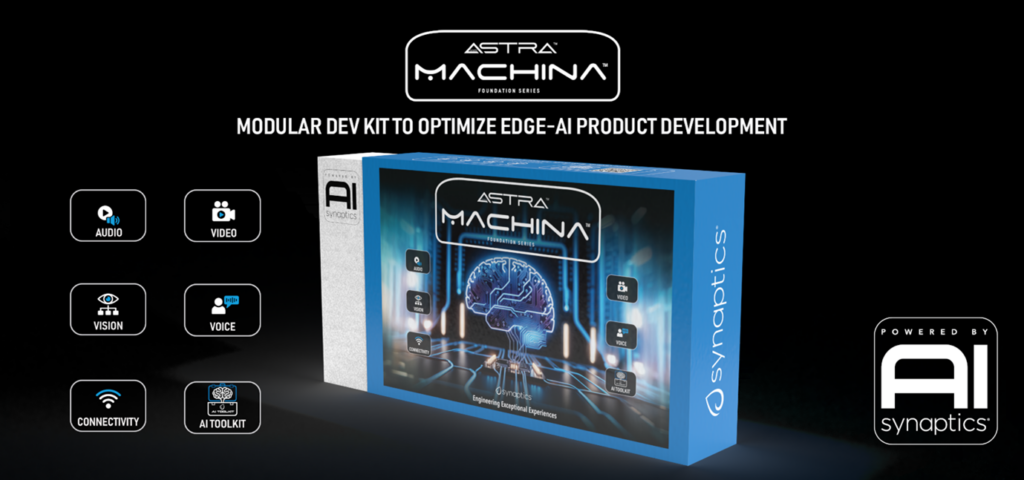At Embedded World 2024, Synaptics launched the Astra AI-native platform to simplify edge AI product development for IoT companies. The platform comprises the SL-Series of embedded processors and Machina Foundation Series development kit, offering AI integration without data center dependency for various edge IoT applications. Synaptics differentiates with unique technologies in sensing, processing, and connectivity. Three SL-Series models cater to diverse application needs, with current availability of processors and the development kit set for Q2 2024 release.

What do we think? Edge AI was a massive topic at Embedded World and is likely to be a huge market by 2030. Synaptics does not have the heft of the biggest players in the market, but they are bringing out products that tick all the boxes and working on a “just enough” ecosystem. What is more, they’ve brought over Todd Lepinski from Arm to give them more commercial clout. Wherever I turned at the show, Lepinski was there, talking to all the right people.
Synaptics progresses Astra range
At Embedded World 2024 in Nuremberg, Germany, Synaptics launched the Astra AI-native platform aimed at making developing edge AI products simpler and faster for IoT device companies. The Astra platform is designed to provide out-of-the-box embedded AI solutions for consumer, industrial, and enterprise products.
We caught up with Vikram Gupta, chief product officer, SVP, and GM, IoT Processors for Synaptics to dig into Synaptics’ foray into edge AI. For some background, check out our interview with Synaptics’ John Weil from CES.
“The SL-Series delivers on the high-performance end of a road map of scalable edge AI IoT compute solutions and will soon be complemented by our power-optimized AI-enabling SR-Series of MCUs,” said Gupta. “Combined with our easy-to-use AI frameworks, customers will be able to bring intelligent IoT products to the market quickly.”
Gupta recognizes, as was evident across the Embedded World halls, that the edge IoT/AI space is crowded and likely to be very competitive.
“Everyone else has 100 gold partners,” Gupta said with a wry smile. “Where we are at, we are hungry, and the ecosystem appreciates that.”
Certainly, Synaptics is getting things done with a certain amount of style. NXP and ST were giving away MCU boards in dull brown sleeves. Synaptics’ packaging for a similar board is something else, more like a retail package. Gupta was frank that this was part of Synaptics’ differentiation strategy, designed to get noticed.

The Astra platform starts by introducing the SL-Series of embedded processors and the Machina Foundation Series development kit. The SL-Series enables designers to integrate AI into their products without relying on the data center, addressing issues related to data privacy and latency. Synaptics says these embedded processors offer AI-capable computing power while maintaining low power consumption, making them suitable for various edge IoT applications. The Astra Machina Foundation Series development kit complements the SL-Series by assisting both AI novices and professionals in utilizing the processors’ advanced AI features, general processing, and graphics abilities, as well as wireless connectivity.
“Demand for MPUs is crossing over to high-performance MCUs,” said Gupta, “as MCUs migrate upwards due to the needs of AI.” Coincidentally, a product range that crosses over between AI-capable MCUs and MPUs is just what Synaptics has launched.
“Sense, process, and connect are the fundamental elements of an IoT system, and we have differentiated technologies in all three areas,” said Michael Hurlston, president and CEO of Synaptics. “While we have historically been leaders in a handful of narrow processor verticals, we are embarking on a journey to bring advanced AI capability to an incredibly wide range of edge IoT devices.”
The SL-Series SoCs are built on Arm Cortex A-series CPUs and include hardware accelerators for tasks like edge inferencing and multimedia processing in various domains such as audio, video, vision, image, voice, and speech.
- The SL1680 is based on a quad-core Arm Cortex-A73 64-bit CPU; a 7.9 TOPS NPU, which Gupta confirmed was designed by Synaptics; a 4K-capable Imagination GE9920 GPU; and a multimedia accelerator pipeline with multiple display output paths. It is designed for home and industrial control, smart appliances, home-security gateways, digital signage, displays, point-of-sale systems, and scanners. The GPU delivers 5.6 gigapixels/sec and 200M polygons/sec, and 89.6 16-bit GFLOPS, or 44.8 32-bit GFLOPS. It is capable of a range of APIs, including OpenGL ES 3.2, DirectFB, OpenCL 1.2, and Vulkan 1.1, and supports the Android Extension Pack.
- The SL1640 is optimized for cost and power, and is based on a quad-core Arm Cortex-A55 processor, a 1.6+ TOPS NPU, and again, the Imagination GE9920 GPU. It is designed for smart home appliances, enterprise conferencing, smart speakers, displays and signage, and consumer and industrial control panels.
- The SL1620 is also based on a quad-core Arm Cortex-A55 CPU subsystem with an Imagination BXE-2-32 GPU for graphics and AI acceleration, audio algorithm processing, and dual-display capability. Applications include enterprise multimedia conferencing, smart appliances, home-security gateways, digital signage, displays, point-of-sale systems, and smart speakers. In this one, the GPU is a more recent model but from the lower end of the Imagination range. The BXE-2-32 is a dual-core (2 pixels per clock) GPU with a clock frequency up to 800 MHz, which despite delivering less raw 3D performance than the GE9920, delivers support for more recent APIs, including OpenGL ES 3.2, OpenCL 3.0, EGL 1.5, Vulkan 1.3, and the Android Neural Networks API (NNAPI) through Imagination’s IMGDNN AP.

The Astra Machina Foundation Series development kit supports the SL-Series. The kit helps AI beginners and experts quickly unlock the processors’ AI capabilities, powerful processing, and graphics performance, and matching wireless connectivity, starting with Synaptics’ SYN43711 and SYN43752 Wi-Fi and Bluetooth combo SoCs.
The SL-Series processors are available now. The Astra Machina Foundation Series development kit will be available in Q2 2024.